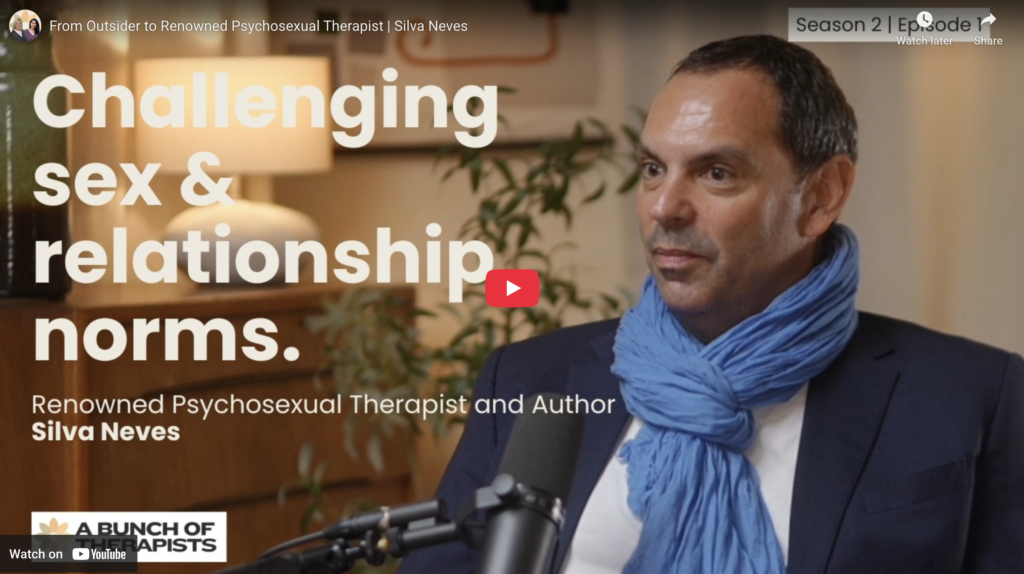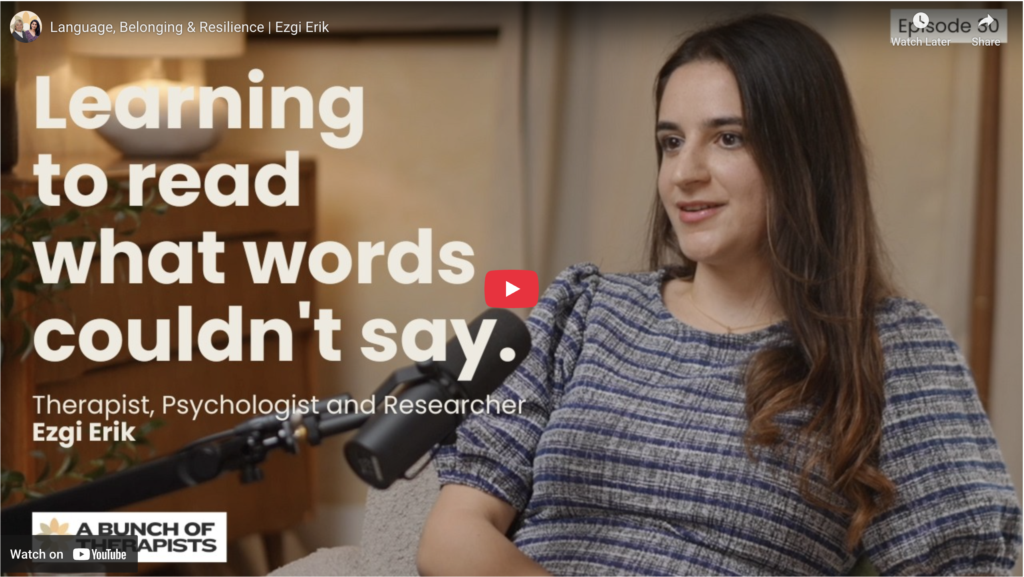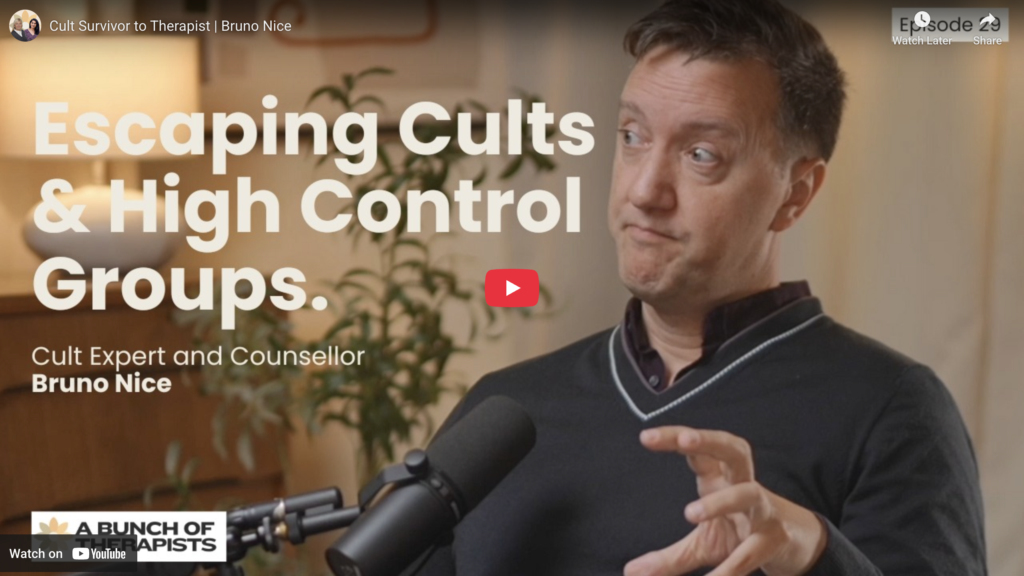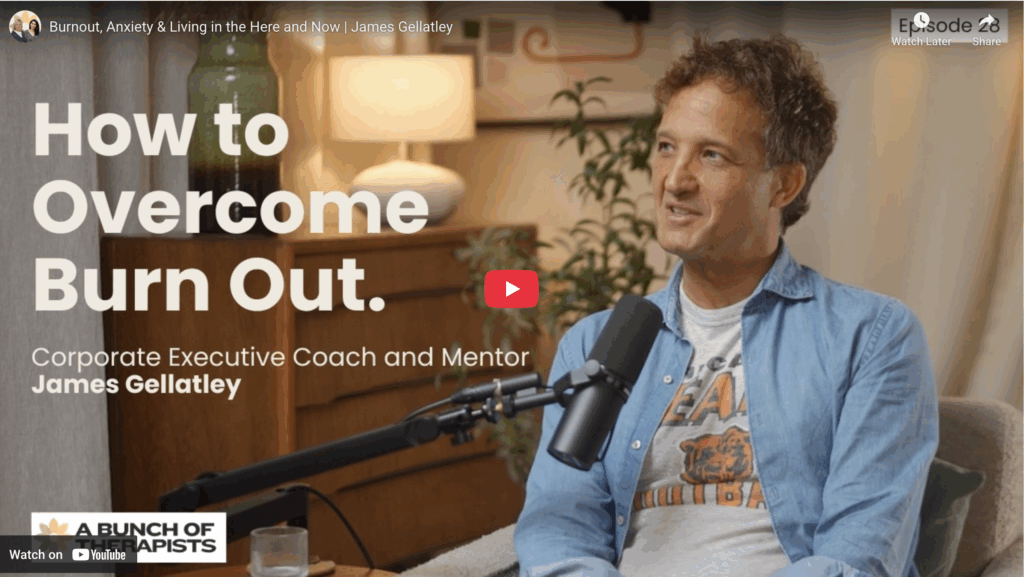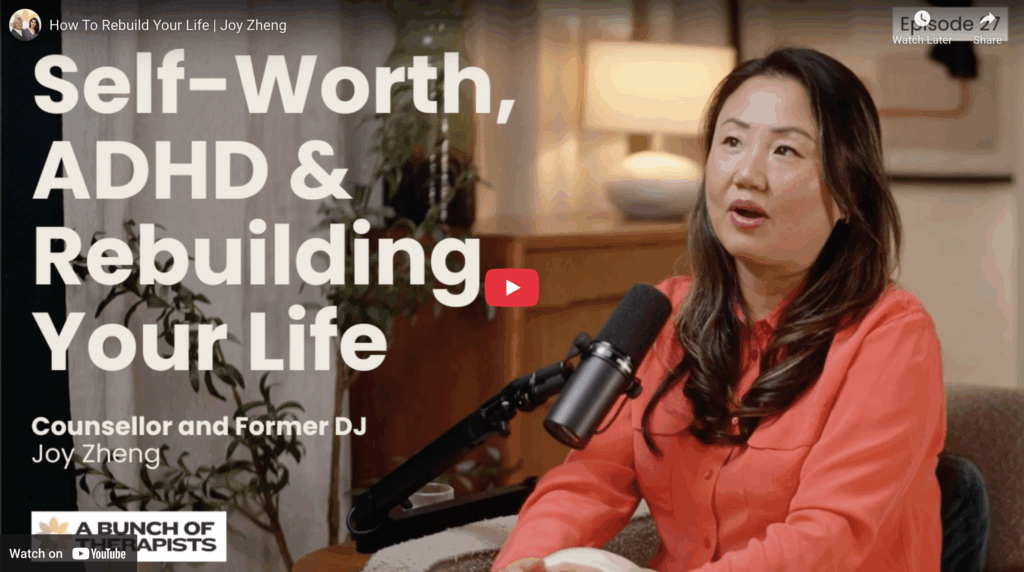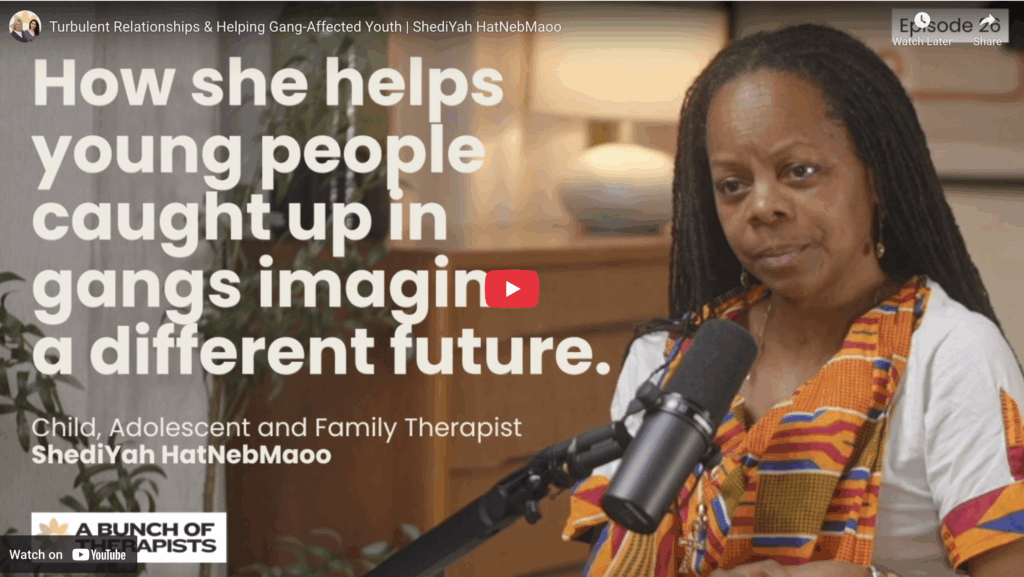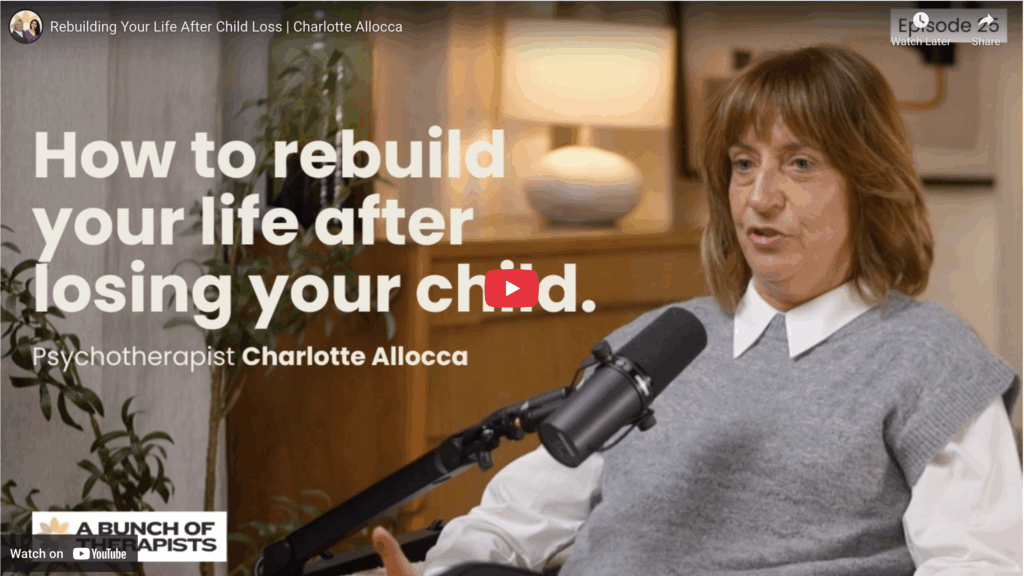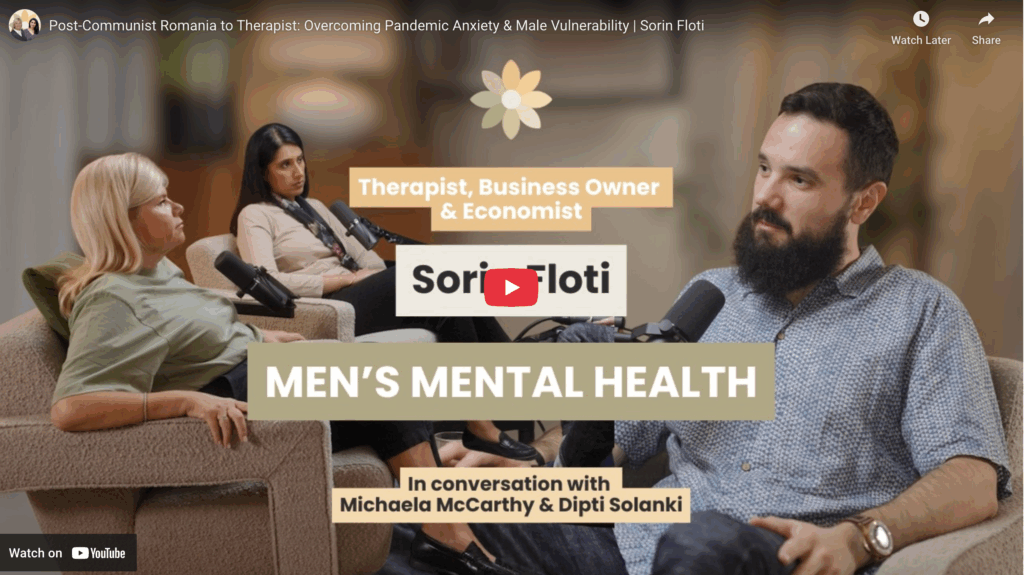Transcript
Intro: Welcome to A Bunch of Therapists. The podcast that goes behind the doors of the therapy room. Our guests will be sharing their experiences of counselling and psychotherapy. And all the lessons they’ve learned on the journey through life. This episode is hosted by me, Michaela McCarthy. Today’s guest is grief coach and counsellor, Dipti Solanki.
Michaela McCarthy: Tell me, why did you go into therapy? You know what made you become interested because you started out as a coach right? So how did that all work?
Dipti Solanki: So, my journey definitely started off as a coach but I’m gonna take it right back to the beginning.
Michaela McCarthy: Okay that’s good.
Dipti Solanki: And I think the reason for going into coaching and therapy is definitely the same. So when I was 13, I lost my mum very, very suddenly to medical negligence. And I have an amazing, huge Indian family. And, you know, as families do, they kind of went like that, they wrapped your arms around you and there is this unsaid narrative of you’ve got to be strong. So, I had so much love I had the most incredible dad and I just carried on with life. You know, outwardly I was doing really well. I was the first person in my family to go to university. I was very proud of that. And I wanted to be an MP. So my first job straight out of uni was a parliamentary researcher. I got married to the love of my life. Life was good. It looked really good from the outside. And you know, everyone said, you know, the kids have done really well. You know, they lost their mum really young, but they’ve done well. And that was something that you felt you had to live up to.
So you just kept on going, because it felt like it was a measure of how well Dad had done with us as well. So you didn’t want to let him down. So you kind of carried on, I carried on and then I was in my job, loved it, you know, to walk into the Lords, into the House of Commons every day, the filming schedules, all of that was very exciting for someone who was just 22 and then I had the most incredible nervous breakdown. I was crippled with anxiety, panic attacks that took me to St Thomas’s for the first time because I actually thought I was dying. And it was then that the doc said to me, ‘It’s just a panic attack, it happens, don’t worry!’, you know, ‘Here’s some little blue pills, some Valium’.And I couldn’t make sense of it. I was like, well, this does not make sense, this is not supposed to happen.
I didn’t take the pills and instead it started a journey of figuring out what the heck happened. Like how can that be? How can I go from this super confident, ambitious, young woman.
Michaela McCarthy: So how old are you?
Dipti Solanki: I was 21/22.
Michaela McCarthy: Okay, so you’re still young.
Dipti Solanki: Yeah, and I was like, this doesn’t make sense. Like I need to understand what happened. And so it was then actually, I didn’t fall in love with therapy straight away because I went to see a lot of therapists and just I got frustrated and I just kept walking out. I was like, I just want someone to figure out and tell me what went wrong, why did that happen to me and it just wasn’t happening for me. And I thought well therapy, what a load of old nonsense, like I’m not gonna bother with that. And it wasn’t until someone kind of tapped me on the shoulder and said, ‘My darling girl, this is grief’.
And so I made it my unsaid mission to just be a voice in the world that says, ‘No, this stuff matters. What happens to us matters.’ And we need safe spaces to speak and we need to focus, we need to feel, we need to heal through that. So…
Michaela McCarthy: Can I just interject?
Dipti Solanki: Yeah, go for it.
Michaela McCarthy: When you lost your mum when you were 13, yeah, what was it like going back into school?
Dipti Solanki: Well, funny enough she died in August so we had it was during the summer holidays and I went back in September and I was as normal as you like and my friends had heard and I said very matter-of-factly ‘Yeah, yeah, my mum died over the summer holidays’ and everyone went ‘Shut up! You’re lying’, as teenagers do and I went ‘No, no she died!’ ‘No! How can that be? You wouldn’t be here otherwise!’ and I think there was a sense of disconnect for other people looking at me because I wasn’t presenting like someone whose mum had just died.
Fast-forwarding from that quite a few years you know I trained as a grief coach very much similarly to you, lots of different training, trained as a homeopath, as a coach, as a life coach, as a grief coach, worked with lots and lots of people, had my own clinic until the pandemic hit, closed the clinic down, went completely online. But it was during that time when I lost my darling, darling dad and that was not only one of the worst things to have ever happened to me but also a point at which I realised that the world of grief support hasn’t changed that much and when I needed that support there wasn’t the right support for me. I went to a lot of therapists and I realised there’s a huge gap of the right support and also culturally competent support actually, because you know…
Michaela McCarthy: Say more about that.
Dipti Solanki: Well. During the pandemic especially there was a disproportiante amount of balck and.. you know, BAME populations that died. And every time I went to a therapist, I found I had to explain how me as an Indian woman with dual nationalities of British, East African and Indian, like that makes me up. But I had to explain that to my therapist and I had to, there was a lot of work I had to do for my therapist that I went to see and in the end I gave up. I was like ‘You just don’t get it. Like, you’re not getting this and I’m not getting what I need.’ and I went into ‘doing mode’ again and I set up the CIC called Grief Matters For All because we can’t just have one type of grief support and grief matters for all is all about recognising that we experience loss in so many different ways you know bereavement, divorce, loss of self, redundancy, there’s so many different types of losses, health losses and also that we all come from different backgrounds, we all have different rituals, we all have different lenses through which we see loss, and our therapists and those people who support us, it’s incumbent upon them to educate themselves about that if they’re gonna step into that arena to support other people. So, that’s what we’re building at the moment. So that’s really important to me. And I think that extends out into, wider into the world of )
I think especially living in beautiful melting pot of London that we live in, like I think we have an extra responsibility to be educated like that. But it was then that work got really busy for me as a grief coach. We had so much more grief.
Michaela McCarthy: Yeah
Dipti Solanki: And I started to get burned out. And I did what I always do, because I couldn’t find the support that I needed. And I threw myself into work, supporting lots of people. And then I remember thinking one day, this is not the way. Because we know what’s going to come, the anxiety, the depression, the panic attacks. And so I kind of checked myself and I found myself a really great therapist in the end.
Michaela McCarthy: And they do exist.
Dipti Solanki: Oh my goodness do they exist. They exist and they change lives. And for that I’ll be forever grateful. And when I found my therapist, the right one, it was at that point where I thought okay it’s time to kind of, because the thing is when someone comes to you for grief and loss, yeah you talk about the grief and loss but then there’s everything else that comes afterwards and that’s when I thought it’s time to equip myself a bit more and that’s when I started my training in therapy. So I went into training at UEL to do my Masters in Integrated Counselling and Coaching. It’s been life-changing. It’s been life-changing and the power of therapy is immense and now I maintain that I think everyone should be in therapy!
Michaela McCarthy: Well, I get that. I think people don’t think that way, some people. And I know there’s lots on socials and everything about wellbeing and mindfulness and you know certain types of therapy, but I think people could actually, if they were curious enough, just go along, and if it’s not right for them, that person like you experienced, try someone else
Dipti Solanki: Yeah, don’t give up, don’t give up. And I think, you know, I think we’ve talked about this before, but there doesn’t have to be a deep sense of there’s something wrong with me to go to therapy. And I think that one of the most powerful pieces of work that we can do is to normalise being in therapy and knowing what a life-enhancing tool it can be.
Michaela McCarthy: What’s your vision for you?
Dipti Solanki: My vision is to normalise therapy.
Michaela McCarthy: Yeah.
Dipti Solanki: And I think that there are a lot of cultural barriers to be broken. There are still a lot of taboos that need to be broken. But also I think that there’s that trend at the moment, and you see it especially, you like TikTok etc., which is great because it’s become a platform for psycho-education, but I think a little bit of knowledge can also be dangerous and you see a lot of people identifying and recognising themselves in that and thinking that that’s enough. But I want people to know the experience of being in a room with a therapist and experiencing that therapeutic relationship develop and watching the layers fall away and really discovering parts of yourself that you never perhaps knew existed, you perhaps were always too frightened to even delve into because you kind of knew it was there somewhere, but to have someone walk alongside you on that journey is a truly life-shifting experience.
Michaela McCarthy: I mean I thought it was quite magical sometimes.
Dipti Solanki: Agree, agree.
Michaela McCarthy: So, tell me, you know, doing counselling and coaching together, how do you think you will work with those two? Because there’s a difference isn’t there, with coaching versus therapy?
Dipti Solanki: There’s a huge difference and I’m really grateful for my training because I’m being trained in the personal consultancy model and so that is a whole framework where we have authentic listening, where we’re really being with the client and then we’re doing the rebalancing. And then we come and only when the client is ready to move on more into the coaching phase, only then do you take a client there. I love my training, I think it’s been incredible and I think it’s kind of really crystallises those two roles because they’re very very different ways of working, very different ways of working but I think it’s a very forward thinking way of working as well.
Michaela McCarthy: So going back to what you were talking about at the beginning going into see a therapist and it just wasn’t working for you. You might not have been ready, I mean that can happen, you were still young, but what would a culturally competent therapist, what would that have been like for you when you went into therapy?
Dipti Solanki: Yeah, so I think what I realised in my 40s, when my dad died, that that was what was missing and I think it would have made the world of difference because what I found myself doing, my therapist was asking me the ‘what’ questions, so ‘what kind of rituals’, ‘well why did that happen?’. And I had to explain the relational structure of my family and the respect culture and why you don’t talk to elders in that way and why you can’t respond and why you can’t talk back and all of this stuff. And what I found is I was coming from a very cognitive place the whole time and I was doing all the educating so nine times out of ten I would leave therapy thinking I didn’t even talk about what I wanted to talk about.
Michaela McCarthy: Yeah, yeah. Do you think then your therapist because they didn’t know or maybe were not open to your culture, that they got stuck in asking you questions about your culture rather than focusing on you and how you felt?
Dipti Solanki: Right, instead of the therapist helping me to make sense of what was going on, I was helping my therapist make sense of what was going on with me.
Michaela McCarthy: Because I wonder sitting here now thinking, okay, so we come from different cultures, okay, and you can get caught up thinking, okay, well the person sitting in front of me is a different culture from me, therefore I’ll ask all the questions about their culture, but they’re actually here to talk about their issues. So surely, it’s better to actually work with you with your issues, okay, process where you’re at with yourself as a person, and then you would tell me along the way, you know, this is how we do it.
Dipti Solanki: I don’t agree completely with that because I think that our stories are intertwined with who we are and my culture very much informs who I am.
Michaela McCarthy: Yeah.
Dipti Solanki: You know, so it’s very nuanced and I think that it’s impossible, it’s an impossible ask to ask a therapist to know everything about everyone’s culture.
Michaela McCarthy: Yeah, they just wouldn’t.
Dipti Solanki: But we need to know highlights. We need to have a general understanding. You know, for example, I remember at one point in the therapy room, I shared something that was such a conflict for me and it was it was affecting everything and the therapist gave me their reflection from a very Westernised point of view, that brought a lot of shame and gaslighting on to myself and I was like ‘Oh, wow!’, and I internal that, because I like to take responsibility. So, I was like, ‘Yeah, no, that’s fine, I’ll do that.” And it wasn’t until I found the therapist I’m working with now, and they helped me unpick that. And I was like, ‘Wow!’, and that’s when I felt relief flooding through my body, because they helped me make sense of myself. So, I think it’s nuanced, I think of course everyone’s not gonna know everything. But, em, we are made up of our cultural stories and our heritage and on a level that we probably don t even realise. Mm. You know.
Michaela McCarthy: But it’s a bit like, you know, I was brought up a Catholic. Mm. And, you know, I’d done all the Holy Communion and all that kind of thing. And em but I don’t practice Catholicism. I’m not against it, but I just don’t practice it. But actually I feel more comfortable in a Catholic church, even though I disagree with some of their beliefs, than I would in another church, because it reminds me of my childhood, and the rituals that we get from our families, that this is what we do.
Dipti Solanki: It becomes part of our being in a way that we can’t really explain I think. A sense of coming home even if you disagree with a lot of it.
Michaela McCarthy: Yeah, yeah. There’s always a lot to disagree with.
Dipti Solanki: Always. With everyone.
Michaela McCarthy: Thank you for that.
Dipti Solanki: You’re so welcome. Thank you.
Outro: You’ve been listening to A Bunch Of Therapists with Michaela McCarthy and Dipti Selenki. If you enjoyed this episode, don’t forget to subscribe, rate and review wherever you get your podcasts. You can also follow us on our socials to keep updated. Until next time, bye!

